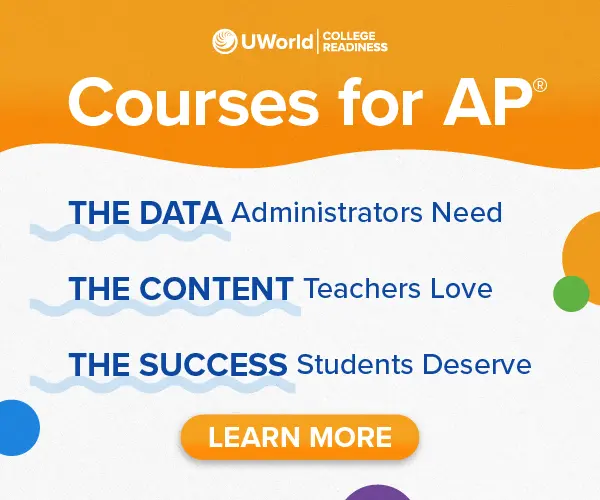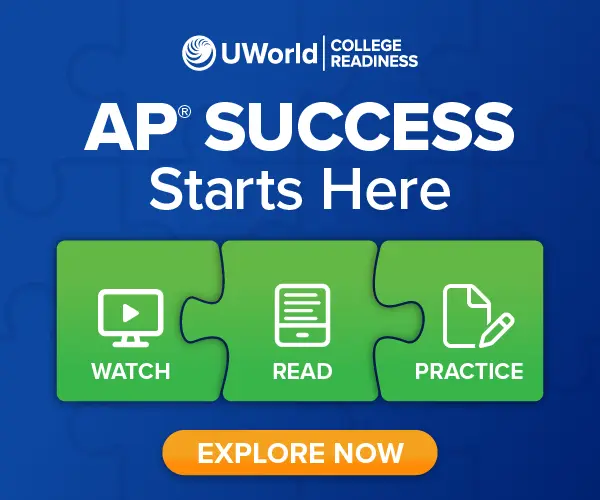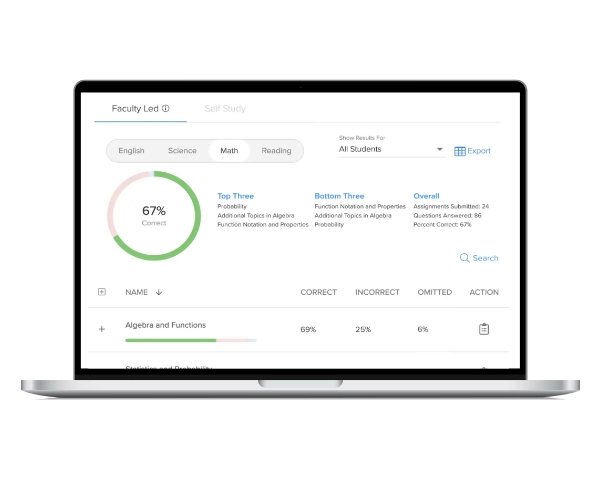Advanced Placement® (AP) courses challenge students with college-level rigor while they're still in high school, but true success requires more than just memorizing facts or chasing high scores. In AP classrooms, students begin to build the skills, resilience, and confidence they'll need to thrive in higher education. By focusing on academic and personal growth, you can help your students go from AP participation to long-term mastery.
What Is AP Mastery and Why Does It Matter?
AP mastery is a student's ability to consistently engage with and excel in AP-level content. While memorizing facts has its place, the heart of deep understanding lies in synthesizing information, evaluating perspectives, and confidently applying knowledge under timed conditions. It requires academic readiness and emotional resilience, especially when tackling rigorous tasks such as free-response questions (FRQs), stimulus-based multiple-choice questions (MCQs), and high-level discussions.
Foundational Knowledge in AP Success
Before students can thrive in an AP setting, they must have solid foundational skills such as literacy, numeracy, critical reasoning, and making interdisciplinary connections. When they lack these core competencies, they often struggle with coursework or disengage completely. That's why it's so important for educators to reinforce these skills well before AP enrollment.
From Basic Skills to AP Readiness
How do you bridge the gap between early academic habits and AP success? With carefully planned support. Just as painters and builders require scaffolding for enhanced stability and reaching new heights, so do AP students.
Scaffolding in Education
In education, scaffolding means building learning structures that support student growth. Rather than jumping straight into high-level content, you can help students by:
- Building upon prior knowledge: Activate student thinking by asking questions that connect to previously learned material, then introduce questions that preview upcoming content.
- Diversifying teaching: Experiment with the “see-read-hear” model. Incorporate videos and other visuals, include applicable reading materials*, and engage auditory learners with direct instruction.
- Emphasizing practice and providing constructive feedback: Regularly assign homework and offer targeted feedback to fill knowledge gaps, not simply point out mistakes.
When your AP instruction includes these components, students can easily reach the next level in their learning. Scaffolding doesn't lower the bar but builds each rung of the learning ladder.

Building Foundational Knowledge
Before students tackle AP coursework, establish a strong academic foundation across core subjects.
Core Skills by Subject
| Math | Algebraic fluency, graph interpretation, and basic statistics1 |
| Science | Data analysis, scientific reasoning, and hypothesis evaluation2 |
| English | Text annotation, argument analysis, and academic writing3 |
| History/Social Studies | Source evaluation, contextual thinking, and comparative analysis4 |
These subject-specific skills form the backbone of AP readiness. By reinforcing them early, you give students the tools to confidently approach complex AP material.
Instructional Strategies for Achieving AP Mastery
Teaching AP-level learners effectively requires tactics that reinforce critical thinking skills, build student confidence, and drive engagement.
3 Stages of Effective AP Teaching
Stage 1: Modeling Critical Thinking Skills
Educators who demonstrate their cognitive processes make higher-order thinking easier for students. This means showing them how to read AP passages, stimuli, or difficult FRQs. Once the model is set, you and your students can approach the content together and share ideas, annotations, and feedback.
Stage 2: Coaching Students
The next stage involves students approaching challenging AP content under your supervision. To support them in this stage, you can encourage students to engage in metacognition (i.e., thinking about their own thinking). Helpful metacognitive prompts may include questions such as:
- What do I already know about this?
- What strategy will I use?
- What can I do differently next time?
With guidance, students will apply what they've learned from instructor modeling and collaboration. They'll also better understand their critical thinking process, preparing them for reflection activities, peer dialogue, and the third stage of the process.
Stage 3: Independent Practice
Students can work independently once they've shown proficiency in adopting cognitive thinking skills, collaboration, and supervised practice.
Teaching tip: Incorporate MCQs and FRQs early and often in the 3-step learning process. UWorld’s easy-to-use AP platform includes these question types for targeted practice and features performance tracking to monitor student progress toward AP mastery.
Building Student Confidence & Engagement
Practical strategies for approaching AP content are only one component of the big picture. Another is building confidence and engagement. You can achieve this by incorporating productive struggle in your AP classrooms. This is when students expend effort to make sense of complex concepts just beyond their understanding. Through that effort, they adopt a growth mindset and relate their struggle to gradual improvement, not failure.
Teaching productive struggle is most effective when using active learning (i.e., engagement) exercises, such as:
- High-level discussions
- Projects
- Gamified learning
The key is to incorporate these active learning exercises in ways that foster collaboration, giving students a safe space to experiment, practice without risking their GPA, and grow as learners.
Teaching AP Students How to Study
Educators who assume that AP learners are adept at studying miss crucial teaching moments. In addition to teaching AP content and driving engagement in the classroom, emphasize healthy study habits and test-taking strategies, such as:
- Process of elimination
- Identifying distractors
- Time management
- Reducing test anxiety
By pairing rigorous AP content with intentional study strategies, you help students approach exams with confidence, resilience, and the tools needed for long-term academic success.
A Roadmap to Academic Mastery
Mastering AP is possible when you emphasize strong foundational knowledge, scaffolded learning experiences, and intentional skill building. Educators who foster critical thinking and allow space for productive struggle strategically prepare students for success — inside and outside the AP classroom.
Frequently Asked Questions (FAQs)
What is the best way to prepare students for AP classes?
Begin by strengthening foundational skills — particularly in reading, writing, and critical thinking. Scaffold instruction, integrate AP-style questions early, and create a supportive classroom culture.
Why is foundational knowledge important for AP success?
Without strong core skills, students struggle with AP content. Foundational knowledge enables deeper comprehension and analysis, making students more confident and capable in AP courses. See Foundational Knowledge in AP Success and Building Foundational Knowledge.
How do teachers make AP content accessible without lowering the bar?
To make AP content accessible, prioritize scaffolding over simplification. This process of supporting student growth may require you to introduce background knowledge or model critical thinking. See Scaffolding in Education.
How can teachers advocate for students with the potential for but not the track record of AP success?
Consider 1-on-1 conversations with the students to understand their motives for taking AP classes and set expectations.
What are effective teaching strategies for AP-level mastery?
Model critical thinking, provide coaching, incorporate frequent low-stakes practice, reinforce metacognition, and emphasize active learning. Use digital tools and data to differentiate and strengthen instruction. See Instructional Strategies for Achieving AP Mastery.
How can teachers track student progress toward AP readiness?
Monitor growth using formative assessments, mock exams, and tools such as UWorld’s analytics. Combine these with student self-assessments for a fuller picture of readiness.
What are some last-minute tips for AP prep?
Lean on FRQ rubrics, prioritize high-impact review (i.e., annually tested content), use high-quality instructional tools, emphasize high-level retrieval practices (i.e., flashcards, notetaking), and reinforce student confidence with positive affirmations.
References
- Intersegmental Committee of the Academic Senates. (2025). Statement on competencies in mathematics expected of entering college students. https://icas-ca.org/statement-on-competencies-in-mathematics-expected-of-entering-college-students
- Massachusetts Institute of Technology. (n.d.). Academic foundations: Preparation for first-year applicants. MIT Admissions. https://mitadmissions.org/apply/prepare/foundations
- College Board. (2022). Build a strong foundation with English 10: AP Seminar [Brochure]. https://apcentral.collegeboard.org
- College Board. (2023). AP United States History course. AP Central. https://apcentral.collegeboard.org/courses/ap-united-states-history










